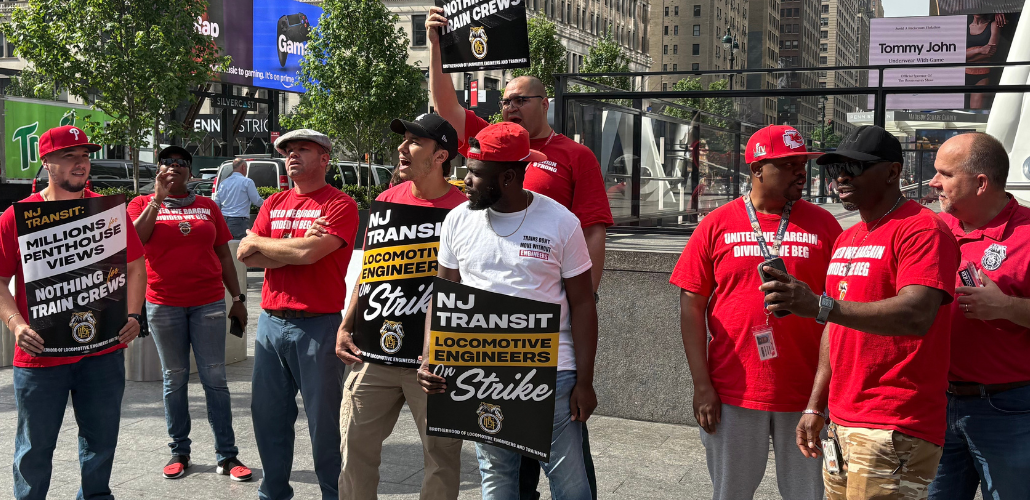Strike Halts New Jersey Transit

The strike by 450 train engineers affects 350,000 New Jersey Transit commuters. "We didn't want to get to this point, but we're here," said one driver. NJT engineers earn $10 per hour less than their counterparts at nearby commuter railroads and Amtrak. Photo: Jake Streich-Kest
Four hundred and fifty train engineers at New Jersey Transit walked off the job overnight, after years of fruitless negotiations with their employer.
These workers drive the state-run commuter trains that serve 350,000 daily riders in New Jersey, New York, and Pennsylvania. As of late Thursday night, NJT train service was completely shut down. The transit system is running additional buses as an alternative, but it’s extremely unlikely that they can make up the difference.
“I take pride in what I do,” said one longtime engineer on the picket line, who didn’t want to give his name for fear of retaliation. “It gives me great joy taking my commuters to and from work every day. I’m moving hundreds of commuters. We didn’t want to get to this point, but we’re here.”
NJT had to cancel its trains and buses to the sold-out Shakira concerts last night and tonight at MetLife Stadium, which holds 82,000 people. Beyoncé also has concerts scheduled there next week.
The central issue is wages. According to the union, the Brotherhood of Locomotive Engineers and Trainmen (BLET, a Teamsters affiliate), NJT engineers earn $10 per hour less than their counterparts who perform similar jobs at nearby commuter railroads and Amtrak.
The area has a uniquely high concentration of rail systems by U.S. standards—and the higher pay entices a steady stream of workers to leave NJT to work at Amtrak and New York’s Metro-North and Long Island Rail Road.
“We’ve noticed the departure of a lot of young engineers,” the same worker said, “because they're looking at the salary now and they’re like, ‘Wait wait wait, this is not working out.’ So they’re coming and they’re getting the skill, and then they’re just leaving.”
This has contributed to a staffing shortage that has led to cancelled trains and major delays, even before the strike.
SIX-YEAR STRUGGLE
BLET members at NJT rejected a tentative agreement by 87 percent on April 15, in a vote with 93 percent turnout, setting the stage for the strike.

SUPPORT LABOR NOTES
BECOME A MONTHLY DONOR
Give $10 a month or more and get our "Fight the Boss, Build the Union" T-shirt.
NJT has been on a public relations offensive since then. The agency calls the workers’ demands unreasonable, and claims they could lead to fare increases.
Management has also claimed that the rejected contract would have raised workers’ annual pay to $172,000 a year, but the union says this is an extremely inflated figure. Workers say it would require enormous overtime to make that much on an hourly rate of $49.82.
NJT workers have been without a new contract since 2019. They’re covered by the Railway Labor Act, under which contracts don’t expire but become “amendable.”
The RLA lays out a maze-like negotiations process that can often take years. Flight attendants at American Airlines—airlines workers are also covered by the RLA—settled a contract in 2024 that had been amendable since 2019.
Under the RLA, the federal government could also intervene to force a deal.
JUNETEENTH SICKOUT
Conflict at NJT has flared in the years leading up to the strike.
In 2022, union members took part in a sickout on Juneteenth, as part of a dispute over whether it was considered a holiday for BLET members. Other NJT unions had settled contracts including the holiday, but the BLET was still in negotiations.
The union had to pay a $50,000 penalty for the sickout, and NJT fired the BLET General Chairman (equivalent to a local union president).
Danielle Smith contributed reporting from a picket line.





